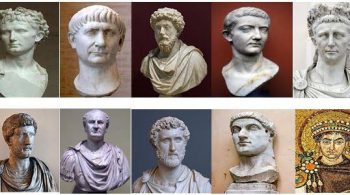We have collected all figures from literary and written material in this list of Greek gods and goddesses. The primordial deities, ancient Greek gods and goddesses from the vacuum at the beginning of the universe are among them. The primordial lovers Gaia and Uranus created the Titans. In Greek mythology, the titans toppled the primaeval gods and ruled during the “Golden Age.” The Olympians were born of the titans Cronus and Rhea, who overthrew them following a ten-year conflict known as Titanomachy.
The ancient Greeks had a set of ideas that helped them understand themselves and the world around them, and they worshipped a wide range of gods and goddesses. Each Greek god and goddess represented something, and the ancient Greeks worshipped different gods for various reasons.
Names of Greek Gods and Goddesses
- Zeus – God of the Sky
- Poseidon – God of the Sea
- Ares – God of War
- Aphrodite – Goddess of Love
- Hera – Goddess of Women
- Demeter – Goddess of Harvest
- Athena – Goddess of Strategy
- Apollo – God of the Sun, Music and Poetry
- Artemis – Goddess of the Hunt
- Hephaestus – God of Fire
- Hermes – the Messenger God
- Dionysus – God of Wine
- Achlys (Caligo) – Goddess of poison
- Aether – God of light
- Aion (Aeternitas, Anna Perenna, Janus, Saturn) – God of eternity
- Ananke (Necessitas) – Goddess of inevitability
- Aphrodite (Venus) – Goddess of love and beauty
- Asteria – Goddess of falling star
- Astraeus – God of stars
- Chronos – God of Time
- Coeus (Polus) – God of wisdom
- Crius – God of constellations
- Cronus – God of heaven
- Dione – Goddess of oracle
- Eos (Aurora) – Goddess of dawn
- Epimetheus – God of afterthought
- Erebus (Scotus) – God of darkness
- Eros (Cupid, Amber) – God of love
- Gaia (Terra) – Goddess of earth
- Hades (Dis Pater, Orcus, Pluto) – God of death
- Helios (Sol) – God of Sun
- Hephaestus (Vulcan) – God of fire
Greek God Zeus
Zeus, God of the Sky, is next on the list of renowned Greek Gods and Goddesses (Zoos).
The pinstriped suit, perfectly trimmed grey beard, stormy eyes, and a very enormous, threatening lightning bolt are all distinguishing features. Read Also:Famous explorers: All you need to know about these legendary explorers
Now: One can find him brooding in his throne room on Mount Olympus, which overlooks the Empire State Building in New York, on rainy days. He traverses the world in disguise from time to time, so be friendly to everyone! You never know who you’ll meet next who might be carrying the master bolt.
Then: Zeus used to preside over his rowdy family of Olympians, who quarrelled, battled, and were jealous of one another.
Symbol: Eagle
Roman name: Jupiter
Greek Goddess Hera
On the list of great Greek Gods and Goddesses, next, we have Hera, Goddess of Marriage, Mothers and Families (Hair’-ah).
Distinguishing Features: Though she may fit in as needed, she likes classic Greek attire and a simple silver crown. She normally takes on the form of a lovely older woman and enjoys transforming into birds when she needs to conceal or spy.
Now: She frequents places where family life thrives, such as the school carpool line, weekend soccer games, and birthday celebrations.
Then: It’s difficult to be the marriage goddess in a household where everyone cheats on everyone else. Hera has no patience for demigods, the offspring of gods. Heracles and many others were her enemies, yet she had a soft place for mortal heroes like Jason. If an elderly lady asks you to carry her across a river on her back, do so. You might gain the goddess’s favour!
Symbol: pomegranate, cow (the motherly animal – no comments, please!), peacock
Roman name: Juno
Greek God Poseidon
On the list of great Greek Gods and Goddesses, next, we have Poseidon, God of the Sea (Po-sigh’-dun).
Distinguishing Features: Hawaiian shirt, shorts, flip flops, and a three-pointed trident.
Now: Poseidon strolls through Florida’s beaches, stopping to converse with fishermen or snap photos for visitors. When he is upset, he creates a hurricane.
Then: Poseidon has a reputation for being grumpy. On his good days, he did cool things like make seafoam horses. On his bad days, he wreaked havoc on towns by causing earthquakes or sinking entire fleets of ships. But, hey, doesn’t a god have the right to throw a temper tantrum?
Symbol: three-pointed trident
Roman name: Neptune
Greek Goddess Demeter
On the list of great Greek Gods and Goddesses, next, we have Demeter, Goddess of Agriculture (Duh-mee’-ter).
Distinguishing Features: The goddess favours modest green or gold clothing. However, people saw her frequently in her gardening attire.
Now: Demeter spends her time in the upper world, where she oversees the growing season and creates commercials encouraging people to eat more cereal products, and in the Underworld, where she visits her daughter Persephone and plays Hades’ wicked mother-in-law, who kidnapped her poor little daughter aeons ago. Persephone still doesn’t think he’s good enough. She should’ve married the physician god!
Then: Demeter was one of the deities who kept to herself. Farmers content Demeter as long as the crops grew and she kept them happy. But don’t dismiss her significance. If you wanted to eat, you had to stay on good terms with Demeter. Demeter prevented all vegetation from growing after Hades kidnapped her daughter Persephone, and people began to starve.
Symbol: Torch, Corn plant (though popcorn works, too)
Roman name: Ceres
Greek God Ares
On the list of great Greek Gods and Goddesses, next, we have Ares, God of War (Air’-eez).
Distinguishing Features: Biker leathers, Harley Davidson, sunglasses and a stinking attitude.
Now: One may usually find him riding his Harley in the LA suburbs. One of those gods who can pick a fight in the middle of nowhere.
Then: This son of Zeus and Hera was inseparable from his shield and helmet back in the day. Fought on the side of the Trojans during the Trojan War, but has been involved in every small skirmish since Goldilocks complained to the three bears about how uncomfortable their mattresses were.
Symbol: A bloody spear, a wild boar (the animal with the nastiest attitude)
Roman name: Mars
Greek Goddess Athena
On the list of great Greek Gods and Goddesses, next, we have Athena, Goddess of Wisdom, War, and Useful Arts (Ah-thee’-nah).
Distinguishing Features: Dark hair, striking grey eyes, and casual yet fashionable clothing (unless she’s heading into a fight, in which case she’ll be wearing full body armour). Athena is never seen without at least one owl, her sacred (and thankfully housebroken) animal.
Now: She favours those who make useful things and will occasionally appear to thank them with magical gifts or helpful advice (such as the lottery numbers for the following week).
Then: Athena was a goddess who was very involved in human concerns. She aided Odysseus, supported the entire city of Athens, and ensured that the Greeks triumphed in the Trojan War.
Symbol: The owl
Roman name: Minerva
Greek God Apollo
On the list of great Greek Gods and Goddesses, next, we have Apollo, the God of archery, music, poetry, prophecy, medicine, and later on the god of the sun. (Ah-paul’-oh)
Distinguishing Features: You’ve got to dig the shades. Apollo likes to look hot, and I don’t mean temperature. Now: Ask him not to recite his poetry. Seriously. Wherever he travels, he enjoys being the centre of attention. He’s a wonderful man if you agree that he’s the coolest person on the planet. Just don’t make him mad, or he’ll become hot under the collar.
Then: Apollo dabbled in everything from music to medicine, most likely because he believed he was better than everyone else at everything. Apollo took over the position of sun god when Helios retired, though he was more known as the deity of poetry and music.
Symbol: the lyre, laurel wreath
Roman name: Apollo (you can’t improve on perfection, baby!)
Greek Goddess Artemis
On the list of great Greek Gods and Goddesses, next, we have Artemis, Goddess of the moon, the hunt, and young maidens (Ar’-tem-iss).
Distinguishing features: Don’t be fooled by Artemis’ appearance as an ordinary mortal maiden of about twelve or thirteen years old. Artemis is a fierce archer who does not tolerate idiots, particularly masculine ones. Her eyes are moon-like silver, and she dresses in white and silver.
Now: Artemis can be found roaming the countryside with her handmaidens, the Hunters of Artemis.
Then: Artemis adored hunting with her handmaidens and, unless she was troubled, stayed to herself. When Artemis was showering, a male hunter tried to spy on her. He was transformed into a deer by the goddess, and her hunters tracked him down and murdered him.
Symbol: The moon, the deer
Roman name: Diana
Greek God Hephaestus
On the list of great Greek Gods and Goddesses, next, we have Vulcan, God of blacksmiths and fire (Huh-fess’-tus).
Distinguishing Features: Massive muscular hands, ugly face, scraggly beard To remind himself who he is, he usually wears a mechanic’s uniform with his name stitched on the pocket.
Now: The god enjoys spending time in his workshop, repairing automobiles and creating new creations. He’s not great with people, but he’s a wizard with machinery.
Then: Hephaestus was ugly from birth, and he didn’t grow any prettier when his parents threw him down from Mount Olympus, rendering him crippled for the rest of his life. He isn’t particularly attractive, but he is skilled with his hands. The Olympians forced Aphrodite to marry him in the hopes of calming her down, but it didn’t work well.
Symbol: The anvil and hammer
Roman name: Vulcan (no Star Trek jokes, please)
Greek Goddess Aphrodite
On the list of great Greek Gods and Goddesses, next, we have Aphrodite, Goddess of Love and Beauty (Ă-fro-dī’-tee).
Distinguishing Features: She is breathtakingly beautiful. It’s difficult to be more descriptive because Aphrodite can transform herself into anything you find most attractive.
Now: She is even more stunning than Angelina Jolie. During New York Fashion Week, she can often be found shopping on Fifth Avenue or trying on new outfits. She enjoys social gatherings and can’t get enough of chatter. You’re probably right if that sounds like a lot of people you know. They may all be Aphrodite in disguise.
Then: Helen of Troy is nothing compared to her. Aphrodite wasn’t hesitant to use her beauty to get her goals. She promised Prince Paris the most beautiful mortal woman in the world if he voted Aphrodite the fairest goddess in a contest, which he gladly accepted. When he married Helen, the Trojan War broke out, killing thousands of people, but at least Aphrodite got what she wanted!
Symbol: The dove, which is strange because it is a symbol of peace yet Aphrodite began a war, but oh well. It’s all about appearances.
Roman name: Venus
Greek God Hermes
On the list of great Greek Gods and Goddesses, next, we have Hermes, God of the Roadways, Travelers, Merchants and Thieves (Her’-meez).
Distinguishing Features: His sign of authority – a winged staff with two snakes, George and Martha coiled around it – is a winged staff with two snakes, George and Martha, twisted around it.
Now: Hermes is difficult to track down because he is continually on the move. In a few millennia, he’ll get back to you.
Then: Hermes began as a troublemaker from a young age. He snuck out of his crib when he was one day old and stole some cattle from his brother Apollo. Hermes appeased Apollo with a new musical instrument he constructed called the lyre, which would have likely blown the small tyke to bits. Apollo was so taken with it that he forgot about the cows. Apollo was highly popular with the ladies because of the lyre, which was more than he could say about the cattle.
Symbol: the caduceus
Roman name: Mercury
Greek God Dionysus
On the list of great Greek Gods and Goddesses, next, we have Dionysus, God of Wine (Dī-oh-nī’-sus).
Distinguishing Features: Leopard-print blouse, walking shorts, purple socks and sandals, and the pasty countenance of someone who has stayed out far too late partying.
Now: Dionysus has been sentenced to one hundred years of “rehab” as director of Camp Half-Blood.
Then: Dionysus created wine, which delighted his father Zeus so much that he elevated him to godhood.
Symbol: the leopard, the grapevine
Roman name: Bacchus
Greek God Hades
On the list of great Greek Gods and Goddesses, next, we have Hades, God of the Underworld (Hay’-deez).
Distinguishing Features: Black clothes made from the souls of the damned, an evil smile, and the helm of darkness (which renders him invisible, so you can’t see the evil smile). He is seated on a throne made of bones.
Now: Because of traffic congestion on the Fields of Asphodel expressway, Hades rarely leaves his obsidian castle in the Underworld. He is in charge of a growing population of the dead and is having employment issues with his ghouls and spectres. This puts him in a bad mood the majority of the time.
Then: Hades is most famous for the sweet way he won Persephone, his wife. He abducted her.
Symbol: the helm of darkness
Roman name: Pluto
Greek God Hypnos
On the list of great Greek Gods and Goddesses, next, we have Hypnos, God of Sleep (Hip-nos).
Distinguishing features: Hypnos appears as a young man with wings sprouting from his brow, most likely to prevent him from falling asleep on his face.
Now: Hypnos resides in Erebos, deep in the Underworld, although he frequently visits the Sleep Shop to try out the mattresses. He is Nyx’s (Night’s) son and enjoys lulling people to sleep.
Then: In ancient times, hypnosis might be beneficial or harmful. He brought relaxation and dreams, but he could also catch you off guard and make you fall asleep at inopportune times. Somnus, in his Roman incarnation, enjoyed making sentinels fall asleep on duty or ship navigators fall asleep at the wheel.
Roman name: Somnus
Greek Goddess Nike
On the list of great Greek Gods and Goddesses, next, we have Nike, Goddess of Victory (Ni-key).
Distinguishing features: Nike is an angel with wings who rides a chariot. She keeps a golden laurel wreath on hand to present to the winners of great battles, sporting events, and the state lottery.
Now: The goddess does not find it amusing to be confused with footwear.
Then: Because everyone wanted to win, Nike was extremely popular. Olympic athletes, like warriors before a major fight, would make sacrifices for her. In battle, Nike would occasionally act as Athena’s charioteer. After all, the goddess of success is the best wheelman you could hope for.
Roman name: Victoria
Greek God Janus
On the list of great Greek Gods and Goddesses, next, we have Janus, God of beginnings, choices and doorways (Jay-nus).
Distinguishing features: Kind of hard to miss Janus, since he has two faces.
Now: Janus enjoys dressing up as a doorman in New York City. He appears when heroes must make a critical decision, usually presenting them with two options.
Then: One of the most significant Roman gods was Janus. January, the first month of the year, bears his name. According to legend, when Janus escaped to Italy after the Titan battle, Saturn granted him the ability to see both the past and the future. Faces on both sides.
Roman name: Janus (he has no Greek name)
Greek Goddess Nemesis
On the list of great Greek Gods and Goddesses, next, we have Nemesis, Goddess of Revenge (Nim-uh-sis).
Distinguishing features: Nemesis is frequently depicted as a winged girl, however, she is not to be confused with Nike! The malicious glint in her eyes should tell you that she isn’t here to help you win. Nemesis’ sign is a scale, which she uses to determine how much luck you truly deserve. She also carries a wheel on occasion, which represents how fate might turn against you.
Then: More than revered, Nemesis was dreaded. Although the Greeks and Romans did not have a notion of karma, Nemesis came close. If anything positive happens, keep an eye out because Nemesis is watching, waiting to counteract it with some bad luck. Keep your head down and stay modest!
Roman name: Nemesis
Greek Goddess Iris
On the list of great Greek Gods and Goddesses, next, we have Iris, Goddess of the rainbow, a messenger of the gods (Eye-ris).
Distinguishing features: Iris appears as a lovely girl with rainbow-coloured wings and the symbolic staff of a herald such as Hermes. When she’s not delivering messages, she serves nectar to Zeus and Hera in the Olympus throne room, which is less exciting but allows her to rest her wings.
Now: Iris is constantly in demand to deliver Iris messages for demigods.
Then: Iris was mostly Hera’s handmaiden. In the old tales, she was seldom given much attention, yet everyone was always glad to see her. She would emerge when you least expected her, like a rainbow, and then vanish silently. The Iris, the colourful component of the eye, is named after her. It’s not much of a tribute, but it’s better than nothing.
Roman name: Iris or Arcus
Greek Goddess Hecate
On the list of great Greek Gods and Goddesses, next, we have Hecate, the Goddess of magic, crossroads and ghosts (Heck’-ate or Heh-cah’-tay).
Distinguishing features: Hecate usually wears dark garments and wields twin torches. She’s joined by a she-dog and a polecat, both of which were once her foes until she transformed them into animals. Later depictions of Hecate included a woman with three heads, or three distinct forms for sunrise, noon, and night.
Now: Hecate is the Titans’ daughter, and despite siding with the gods in the Titan War, she is a secretive and cunning figure. Circe and Medea, who were not exactly girl scouts, were among her followers, and magic is her domain. However, one can find Hecate in foggy graveyards or at night at abandoned crossroads.
Then: Hecate was a terrifying deity. Her power was revered by the Greeks and Romans, but they did not worship her. However, she was the goddess of dark and unknown powers, and her three varied appearances made it impossible to predict whether she would be a good or bad cop.
Roman name: Hecate
Greek Goddess Tyche
On the list of great Greek Gods and Goddesses, next, we have Tyche(Tike-ee), the Goddess of good luck and fortune.
Distinguishing features: Tyche can pass for her sister, Nemesis, which means you must be cautious. Tyche generally carries a cornucopia, or horn of plenty, laden with nuts, berries, fruitcakes, bonbons, and other delicacies that symbolise the good fortunes she bestows on mankind.
Now: Tyche is a difficult deity to track down. People are always on the lookout for her at the racecourse, the casino, and the lottery ticket seller, but she rarely appears. She likes to bestow good fortune on people who have worked hard for it. Nonetheless, Tyche can be unpredictable at times.
Then: People do not evolve! Greeks and Romans prayed for Tyche’s favour in gaming, contests, and competitions back in the day.
Roman name: Fortuna
FAQs On Greek Gods and Goddesses
Who are the 7 main Greek gods?
Zeus, Poseidon, Hera, Hestia and Demeter, Hades, and later on Apollo, Artemis, Hermes, Athena, Hephaestus, Aphrodite and Ares.
Who are the 3 most powerful Greek gods?
The Big Three are the three most powerful gods among the Olympians – Zeus, Poseidon and Hades, the three sons of Kronos and Rhea.
Who was the ugliest Greek god?
Hephaestus. Hephaestus is the son of Zeus and Hera. Sometimes people say that Hera alone produced him and that he has no father. He is the only god to be physically ugly.
Who is stronger, Zeus or Hades?
Even though Hades is more powerful, that doesn’t mean he has to be king. Look at Poseidon. He’s more powerful than Zeus and more likeable, but he isn’t king either.
Is Apollo stronger than Zeus?
He’s the strongest demigod son, but Zeus has godly offspring stronger than him, like Apollo. Talking about other mortal sons of Zeus, Perseus would probably be second to Heracles.
Who is the Greek god of poop?
Sterculius is the god in question. He’s Roman, not Greek. And “feces” is kind of stretching a point. He was the god, actually, of manure.
Who is the prettiest Greek goddess?
Aphrodite was the most beautiful of all the Goddesses and there are many tales of how she could encourage both Gods and humans to fall in love with her.
Who is the Greek god of stupidity?
In Greek mythology, Koalemos (Ancient Greek: Κοάλεμος) was the god of stupidity. Aristophanes mentioned this once and people also found that in Parallel Lives by Plutarch. Coalemus is the Latin spelling of the name. Sometimes people refer to it as a dæmon, more of a spirit and minor deity.





